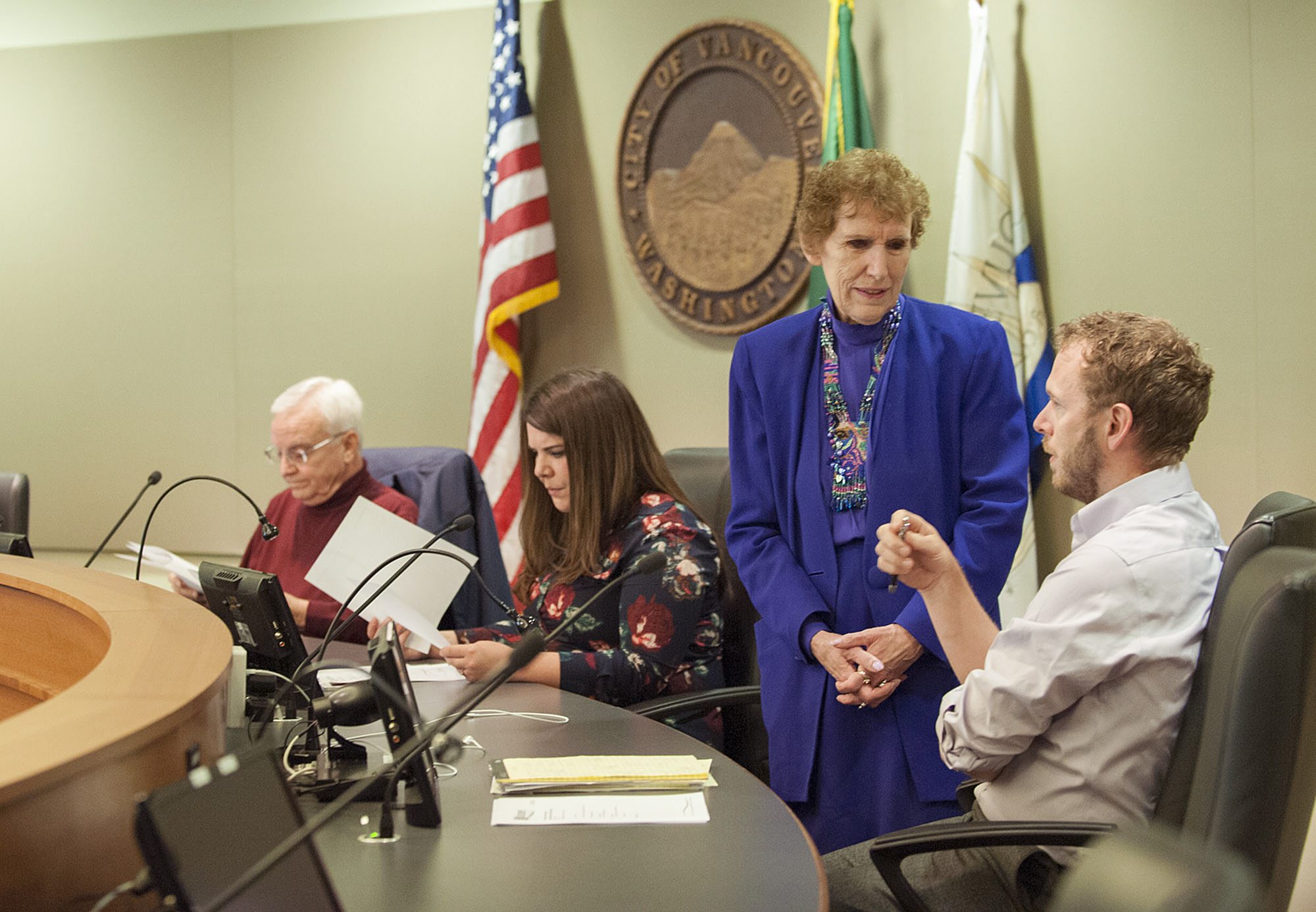The city of Vancouver’s Salary Review Commission adopted an ordinance by a 3-2 vote Wednesday setting the mayor and city council’s dramatically higher salaries for 2017-18.
The move formalizes the commission’s 3-2 vote Friday to hike the mayor’s pay by 117 percent, from $27,600 a year to $60,000 beginning in January. The five-member commission also boosted the mayor pro tem’s annual pay from $24,000 to $37,500 (a 56 percent increase) and the rest of the city council’s pay from $21,600 to $32,496 a year (a 50 percent increase).
Commissioners MarCine Miles, Magan Reed and Thomas Hackett voted for the pay raises. Commissioners Barry Hemphill and Stan Girt voted against them, having earlier put forth a failed motion to boost salaries by 5 percent.
The commission, which has met seven times this year, has absolute power to set the salaries, and its decision is not subject to review by the city council. Overall, the commissioners are divided between those who say higher pay is necessary to attract a diverse pool of qualified candidates and those who say it’s a public service position, not a full-time job, and should come with a small paycheck.
Public Meeting
• What: A meeting to discuss the current increase in wages for the Vancouver mayor and city councilors.
• Who: Meeting organized by two former Vancouver mayors opposed to the increases.
• When: 2:30 p.m. Sunday.
• Where: IAFF Local 452 union hall, 2807 N.W. Fruit Valley Road, Vancouver.
Vancouver’s city manager, Eric Holmes, earns $210,000 to handle the city’s administrative duties, whereas the mayor and council set policy.
Mindful of the public controversy surrounding the salary hikes, the commissioners Wednesday questioned Assistant City Attorney Brent Boger about what would happen if a voter’s referendum were placed on an upcoming ballot to overturn their decision. Boger said a referendum would be a simple yes-or-no vote that wouldn’t offer a salary alternative.
The commission could adopt a second ordinance stipulating that if voters passed a referendum to reject the salaries, a second set of salaries would go into effect, giving voters a clear alternative, Boger said. However, commissioners said they didn’t like that idea because it would seemingly presume the outcome of the referendum. They preferred to convene again after the election to reset the salaries, they said.
Hackett asked what if voters were to keep rejecting the salaries the commission set.
“It would send us a message at that point,” Girt replied.
Hackett noted that if voters repealed the salaries, there was nothing stopping the salary commission from resetting the salaries just a dollar higher or lower.
“I’m not saying it’s a good idea,” he added.
Two former Vancouver mayors, Bruce Hagensen and Royce Pollard, are exploring the possibility of a referendum asking voters to repeal the salary commission’s decision. Organizers would need to collect about 2,700 signatures within the next 30 days to place the referendum on November’s ballot — but only if the council declared it an emergency. The next municipal general election isn’t until November 2017, but Vancouver’s city charter Section 10.08 allows the city council to call for a special election “if, in its judgment, an emergency exists.”
Boger said the city would be evaluating the matter over the next few weeks.
“This is unique to my legal career. I’ve never had to deal with anything like this,” Boger said.
Wednesday, Councilor Alishia Topper said this was the first she’d heard the city council may need to declare an emergency to hold an election this year and that she’d need to do more research.
However, she said, if referendum organizers collect enough signatures, “I don’t know what the difference would be (between) this year or next year. I don’t see why they’d want to wait.”
Mayor Tim Leavitt, who lobbied hard for a salary hike, said he’d need to learn more about the potential referendum and what its ramifications are before he would agree to a special election. He isn’t seeing a public outcry about the pay issue aside from a rowdy bunch of former elected officials, he said.
Leavitt, who will benefit from the 117 percent pay raise for at least one year before his term ends, said the pay issue “is not about me.”
“This is about the ability of future councils and mayors to attract a broader level of interest,” he said. “It takes a lot of time and effort to be thoughtful and weigh in on these decisions of paramount importance.”
The general public, Leavitt said, doesn’t want “someone who’s just volunteering for the job and doing it as a pastime because there’s nothing better to do.”




